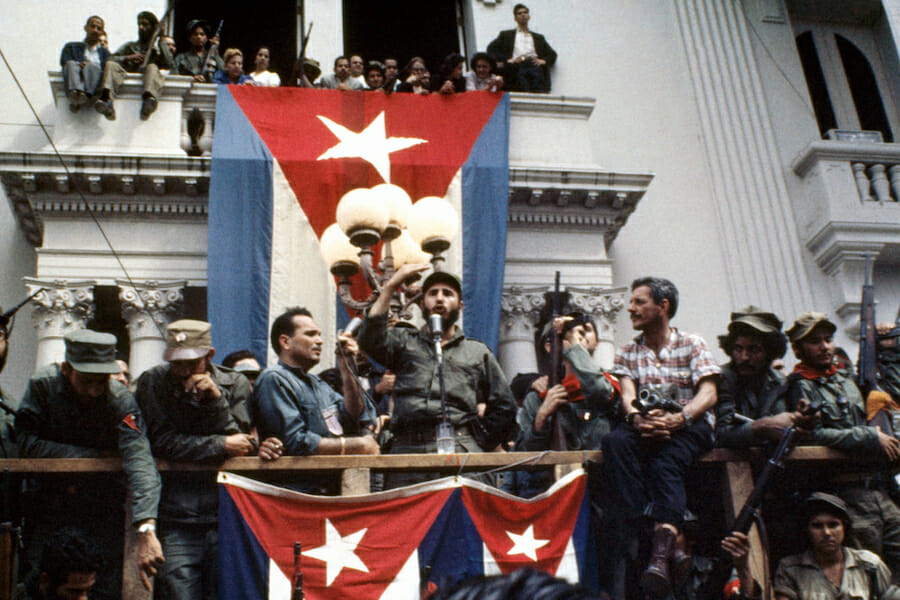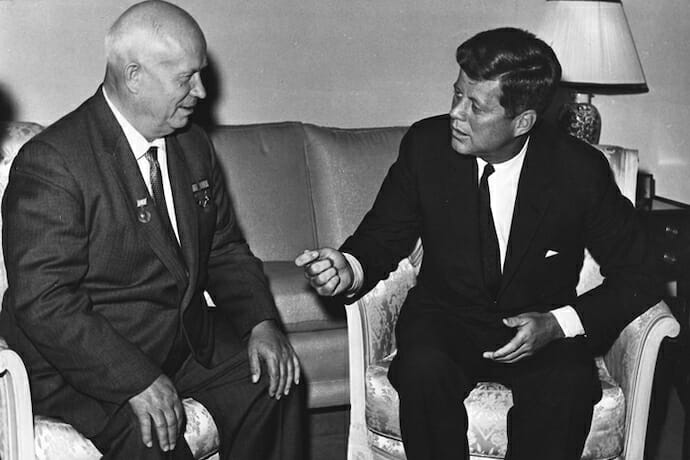
Standing at Bay – Facing Failure in Cuba in 1961 and Beyond
In the opening remarks of his presidency, John F. Kennedy promised that his administration would “pay any price, bear any burden, meet any hardship, support any friend, oppose any foe, in order to assure the survival and the success of liberty.” His closest advisors and supporters believed this “Kennedy Doctrine” was a tough, but necessary, stance against the Soviet Union that evolved from the policies of Truman and Eisenhower. While Kennedy’s strategy followed a similar vein, his decision to shift focus to Latin American caused far more dangerous and proximate problems.
On New Year’s Eve 1958, more than two years before JFK assumed the presidency, Cuban President Fulgencio Batista told his top aides that he was fleeing the country after losing a six-year armed struggle against a self-proclaimed socialist and Marxist revolution led by Fidel Castro. A few hours later, Batista left the country by plane. According to the New York Times, “The news of Batista’s flight touched off wild demonstrations in the capital. Shouting and cheering throngs surged through Havana.” This jubilation, however, descended into bedlam. Soon, “gambling casinos…were sacked” as shops were looted and wealthy estates vandalized.
When Castro overthrew Batista, the U.S. foreign policy establishment was unsure about what Castro even stood for. As the Times further reported, “[P]recisely what he [Castro] believes in, and what kind of social, economic and political program is now in store for Cuba is shrouded in ambiguity.” The U.S. would soon discover an antagonistic agenda. As Castro’s regime hard-handedly assumed power, “it severed the country’s formerly strong ties” with the U.S. by “expropriating U.S. economic assets in Cuba” while building and strengthening an alliance with the Soviet Union. Such decisions aggravated American officials who disliked having an enemy only 90 miles from Miami. The Eisenhower administration began rectifying the situation by describing Cuba as a Cold War threat while planning a covert Central Intelligence Agency (CIA) operation that recruited exiled Cuban counterrevolutionaries to invade Cuba and overthrow Castro’s rule.
Eisenhower green-lighted the operation and allocated nearly $13 million towards its execution on August 18, 1960. Allegedly facing bureaucratic pressure to support the plan, JFK was briefed on the latest developments for the operation (now named Zapata). With the backing of his national security team, including numerous Eisenhower holdovers, Kennedy was convinced that “Castro was a Soviet client” who posed a serious threat to U.S. interests in Latin America and had to be destroyed. The operation would proceed as scheduled. On paper, Pluto was a success. In reality, this neatly-planned CIA operation became the Bay of Pigs fiasco. The U.S. airstrike of Cuban airfields on April 15th failed to destroy Cuba’s air force, which provided the regime with air superiority. Hearing about the invasion before it had even begun, Castro “rapidly mobilized his militia of 200,000 men” and sent his land forces to meet the CIA-trained Cuban exiles at the beachhead. As the exiles encountered heavy resistance from the Cuban army, JFK refused to authorize another airstrike to conceal American involvement. Thus, Castro used his planes and artillery to obliterate the rest of Brigade 2506.

The invasion was an unmitigated disaster. If JFK’s goal had been to remove Castro or weaken Soviet influence, he accomplished the opposite. Castro was emboldened and more powerful than ever. Cuba built stronger ties with the Soviets as it clung to survival against an adversarial America. When JFK went on national television to explain the failed invasion, he quipped, “Victory has a thousand fathers, and defeat is an orphan.” To clarify who the American people should blame, JFK told them: “I am the responsible member of government.” Nonetheless, in the Bay of Pigs postmortem, two groups emerged to assign blame for the operation’s failure. One side (the CIA and the military brass) blamed JFK’s “decision to cancel the second airstrike” and “salvage the operation through military intervention.” The other side (White House officials) held the CIA liable for “faulty assumptions about overthrowing Castro” and misleading the Administration about the operation’s prospect for “success.” I would argue that the culpability lies with the CIA for misdirecting the White House about the Cuban situation, but blame can also be assigned to JFK for not learning from his mistakes in the months following the Bay of Pigs.
First, when holding officials responsible for a foreign policy debacle, one criterion should be whether they fulfilled their promises. While JFK routinely kept his word during the operation, CIA Deputy Director for Plans Richard Bissell and Director Allen Dulles were profiles of misdirection and miscalculation. Bissell called JFK’s second airstrike cancellation “the gravest contributory factor in the operation’s failure,” yet JFK never suggested he would undergo any action that risked “let[ting] the U.S. hand show,” as Eisenhower had once stated. Throughout the planning process, JFK qualified his approval with the need to minimize “the attendant political risk” and “reduce the noise level.” He even told the press, “There will not be, under any conditions, an intervention in Cuba by the [U.S.] Armed Forces.” Hence, when the operation went awry, and the CIA and JCS recommended U.S. destroyers or jets, JFK repeated what he had always promised, “I don’t want the [U.S.] involved in this.” The CIA may have believed JFK’s press statement was “a superb effort in misdirection,” but it wasn’t for the president. Although JFK can be faulted for not rigorously questioning the military and intelligence staff, it’s challenging to blame JFK when he routinely told the planners and the public there would be no military involvement—and stuck to his promise.
Conversely, the CIA misinformed JFK about the requirements for success and poorly understood the situation in Cuba. The crux of the operation rested on exiles “set[ting] off a chain reaction of mass defections” and “trigger[ing] an uprising” against Castro. Without a popular uprising, the coup would fail. When JFK asked Bissell if the Cuban people would “side with the brigade…Bissell insisted that the brigade could count on the ‘active support’ of a quarter” Cubans. Yet Bissell didn’t tell JFK that he knew there was no “‘true organized underground in Cuba’ or ‘evidence that Cubans…could or would join the invaders or that there was any…resistance movement.’” Consequently, when the “‘predicted uprising of the Cuban people’ never occurred, JFK aides felt ‘deceived by Bissell.”’ JFK’s decision rested on Bissell’s assurances, which were injudicious or deceptive.
In the long-term, however, both sides are equally at fault. JFK and Bissell referenced ‘sobering lessons’ from the incident, but it doesn’t seem clear that these lessons were understood. In a speech before the American Newspaper Publishers Association on April 27, 1961, JFK quoted “a wise man” who once said: “An error does not become a mistake until you refuse to correct it.” But JFK did not correct the mistake. He soon authorized the failed Operation Mongoose—more ‘ambitious’ than the Bay of Pigs. It too backfired spectacularly. Even worse, successive administrations “drew on the basic blueprint” of Cuba for covert actions that “brought violence and bloodshed abroad” and damaged U.S. credibility. Such operations occurred in Laos (1964), Operation Phoenix in Vietnam, Chile (1973), and Nicaragua (1981). The Bay of Pigs was an indisputable disaster, but the real mistake was our government’s inability to learn from its mistakes. As U.S. policymakers debate strategies and options in China, Iran, Russia, and North Korea—to name a few—they should pay careful attention to not repeating some of America’s greatest blunders

